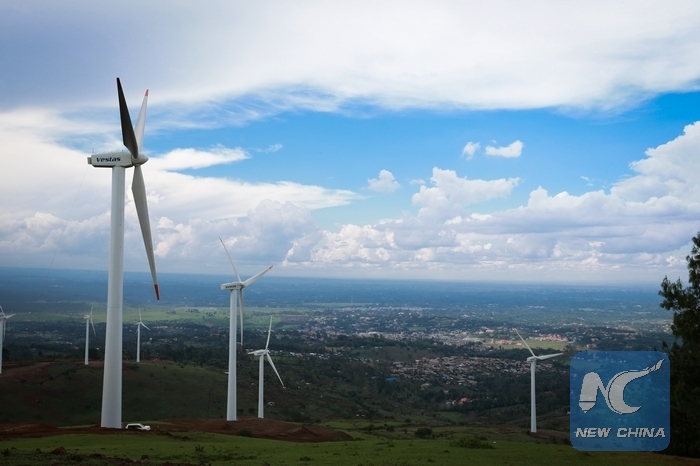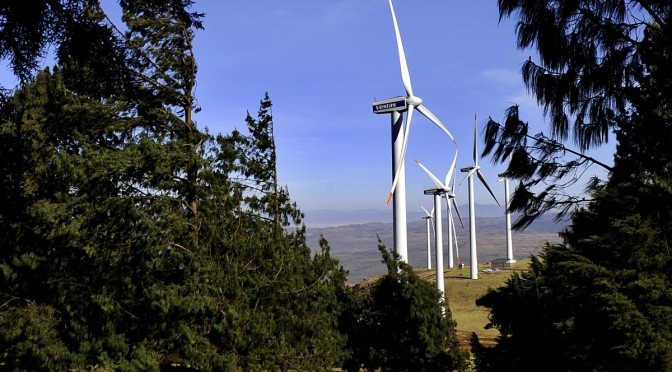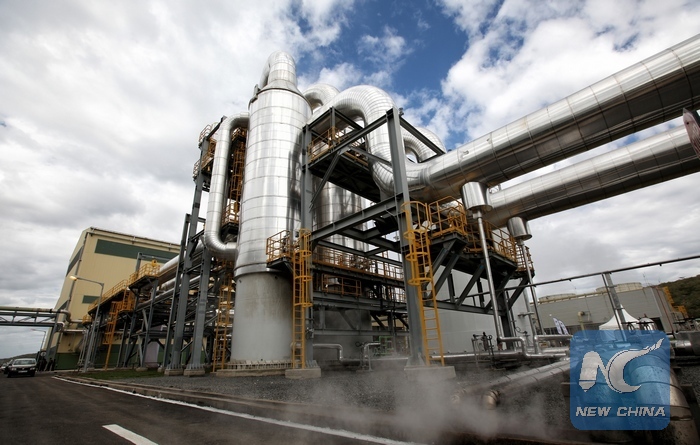Massive investments in green technologies will not only strengthen Kenya’s resilience to climate change but also boost air quality in cities and rural towns, an expert told Xinhua on Monday.
Duncan Onyango, a senior lecturer at the University of Nairobi’s department of environmental and biosystems engineering, said that Kenya’s clean air status will only be sustained if the government and industry make deliberate efforts to reduce over-reliance on fossil fuels.

Wind turbines are seen at an wind electricity station on Ngong Hill, near Nairobi, capital of Kenya, on April 20, 2015. The 46th World Earth Day falls on April 22, 2015. Kenya possesses rich wind, geothermal and other green energy. In recent years, the country develop wind and geothermal power generation projects, which not only reduces the cost of electricity, but also achieves the purpose of environment protection. (Xinhua/Pan Siwei)
“Our air quality is not the best but on average we are better than many countries in the rich and developing world. Our low industrialization level explains in part why there is no acute air pollution in the country,” Onyango said.
He added that Kenya’s enviable clean air status will attract investments in the country while reducing the burden of respiratory diseases.
Kenya emerged the least toxic country globally, according to Eco Experts, a renewable energy firm relied on data from the World Health Organization (WHO) and International Energy Agency (IEA). It was followed by Tanzania, Ethiopia, Mozambique, Cameroon and Zambia while Gulf States were ranked among the most polluted due to intensive production and consumption of fossil fuels.
The study took into account air pollution, energy consumption and renewable energy production.
Researchers from Eco Experts warned that uncontrolled emission of green house gases will wreak irreversible damage to the planet and human race.
Kenya requires a progressive regulatory and policy environment to facilitate adoption of green technologies that are required to boost air quality in rapidly growing cities.
File photo taken on Oct. 17, 2014 shows the 140-megawatt Olkaria IV Geothermal Power Plant in Naivasha, Kenya. Kenya possesses rich wind, geothermal and other green energy. In recent years, the country develop wind and geothermal power generation projects, which not only reduces the cost of electricity, but also achieves the purpose of environment protection. (Xinhua/Zhou Xiaoxiong)
Onyango stressed that additional investments in clean energy sources like geothermal, wind and solar are an imperative to reduce air pollution in the east Africa’s biggest economy.
“We need to focus on cleaner production systems by harnessing renewable energy sources that are abundant in Kenya and other countries in the tropics. The benefits will be felt in the long-term,” said Onyango.
He urged the government and industry players to establish solid deterrent measures to curb green house gas emissions during exploitation of the newly discovered oil, gas and coal reserves.
“Coal mining and oil exploration will definitely compromise air quality in the country but enforcement of environmental laws will minimize atmospheric pollution,” Onyango remarked.
He noted that advanced manufacturing will reduce air pollution while accelerating Kenya’s low carbon development.
The WHO said in its latest assessment that air pollution in many parts of the world increased by 8 percent between 2009 to 2016.
Globally, an estimated 7 million people die every year due to complications linked to poor air quality.


